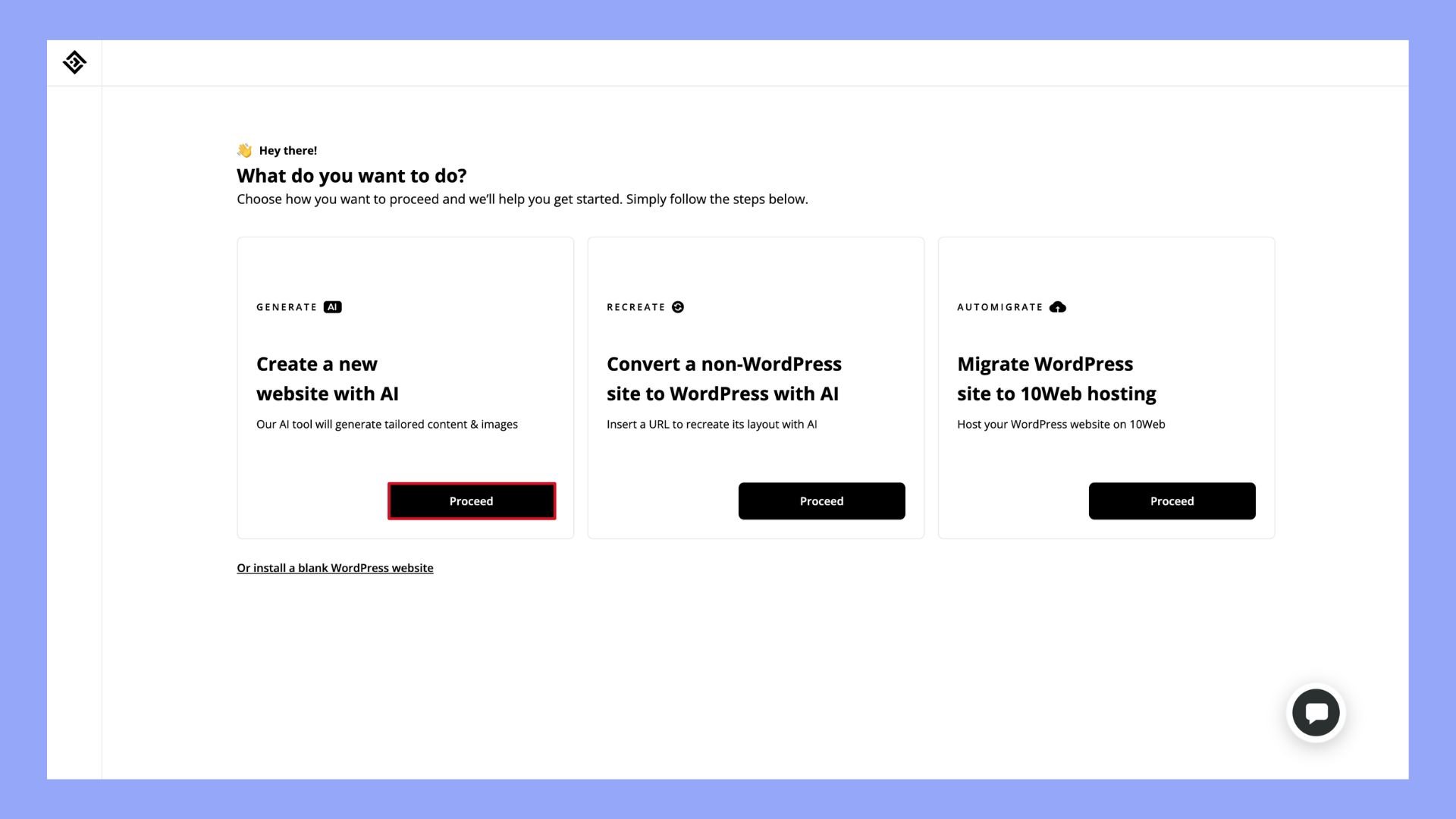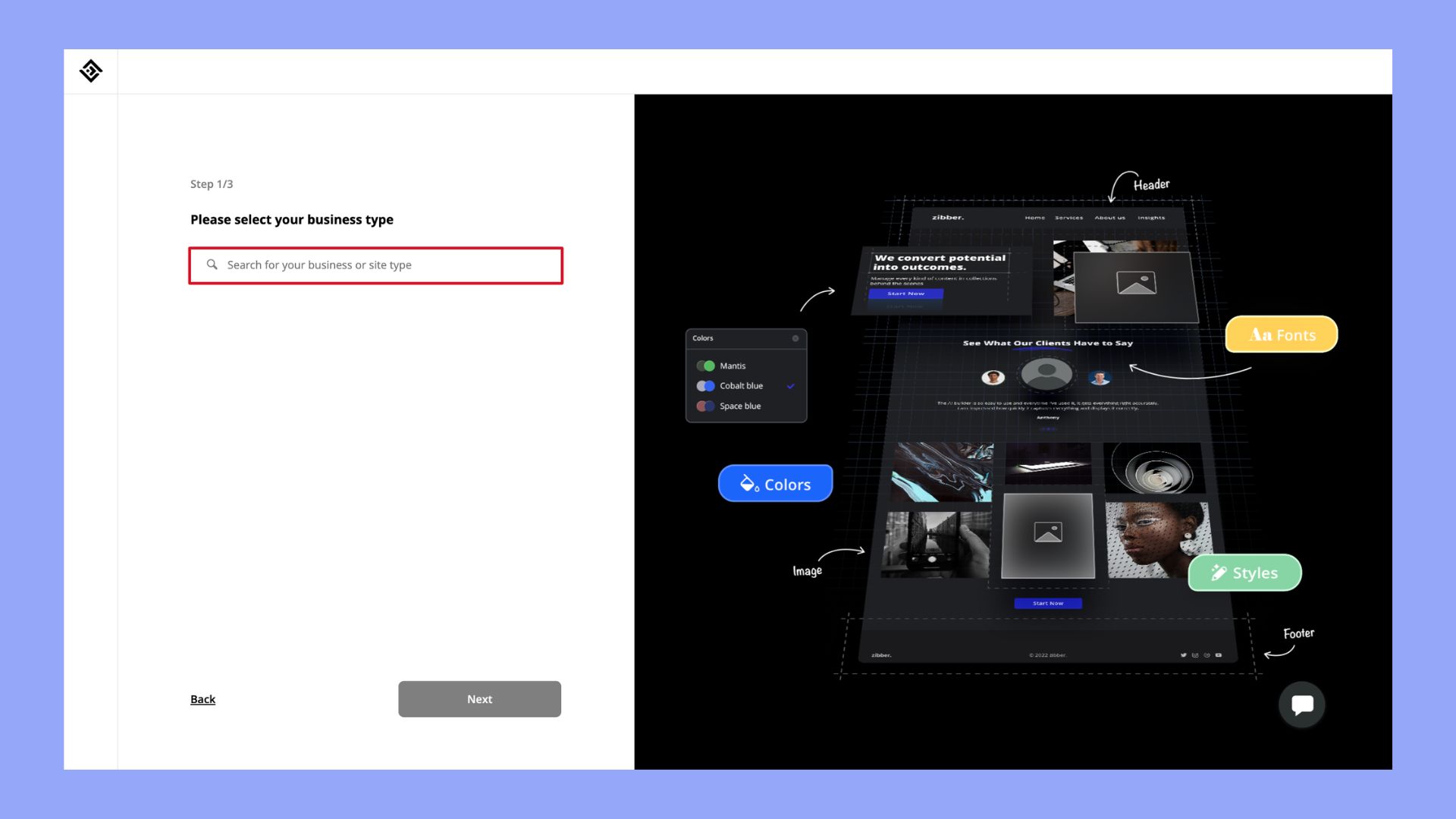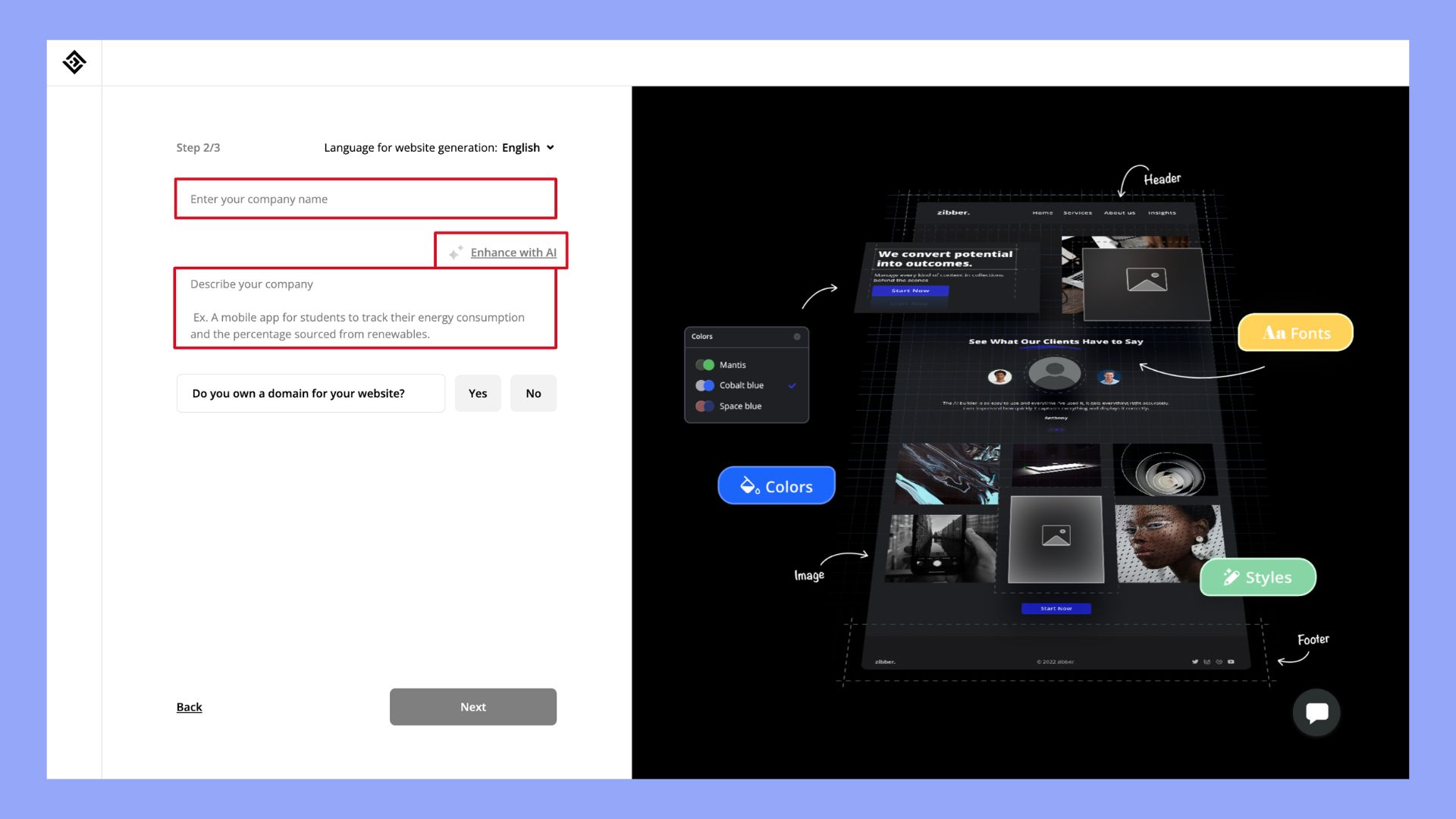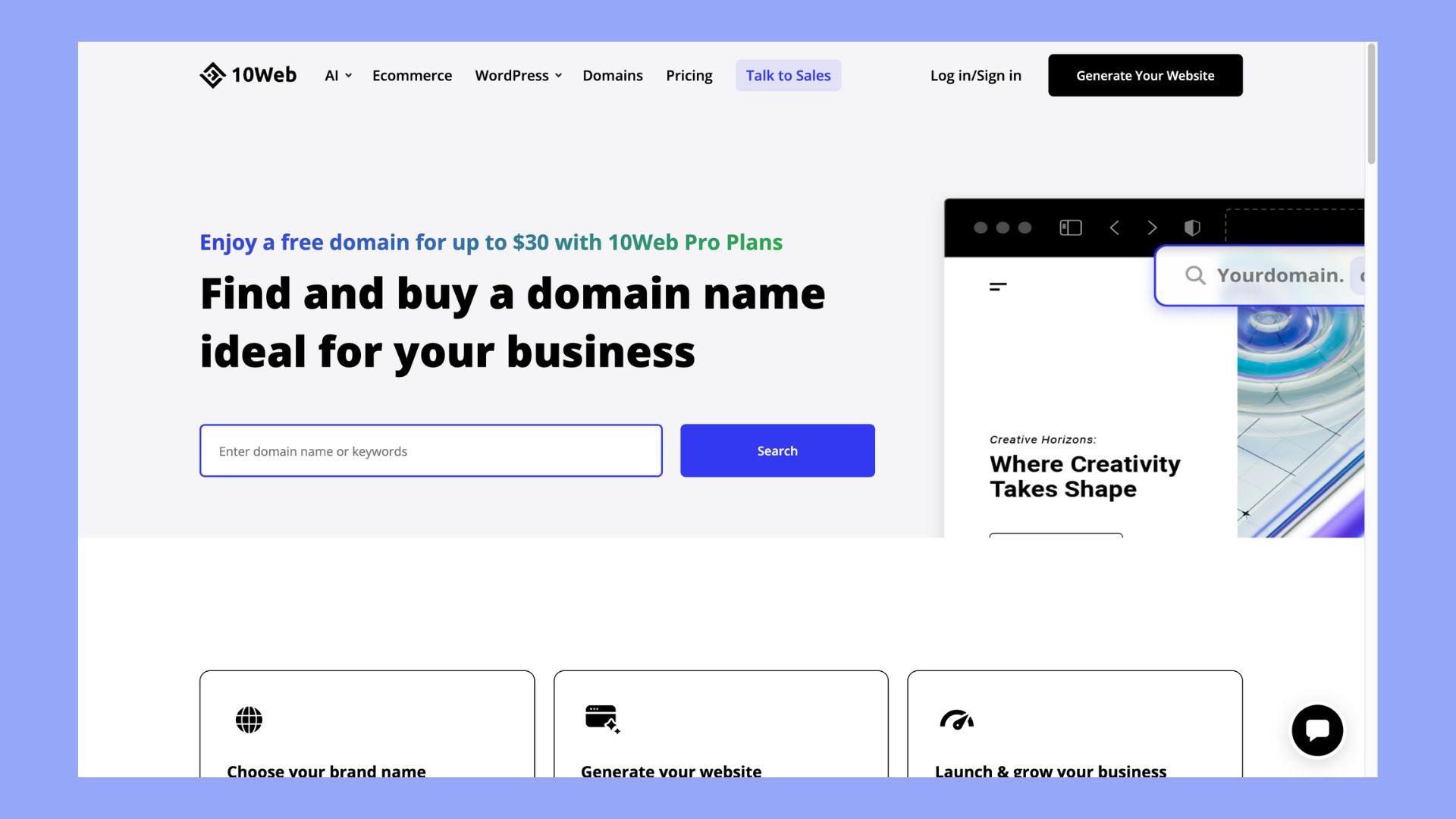Nowadays, more people are seeking guidance to lead healthier, more balanced lives, creating a growing demand for knowledgeable and empathetic health coaches. This article provides beginners with essential tips on how to kickstart a successful health coaching business, offering insights into everything from obtaining certifications to marketing your services. Embarking on this journey not only opens doors to personal fulfillment but also offers the opportunity to make a significant positive impact on others’ lives.

FAQ
Is health coaching profitable?
How do I start a wellness coach business?
- Obtain relevant certifications and training.
- Define your niche and target audience.
- Develop a business plan outlining your services, pricing, and marketing strategies.
- Build a professional online presence with a website and social media profiles.
- Network with other professionals and potential clients.
- Set up necessary business operations, such as registering your business and obtaining insurance.
How much do you charge as a health coach?
What is needed to start a coaching business?
- Relevant certifications and training in your coaching niche.
- A clear business plan and defined target market.
- A professional online presence, including a website and social media.
- Marketing and networking strategies to attract clients.
- Business operations setup, including registration, insurance, and financial management tools.
- A commitment to continuous learning and adapting to market needs.

Looking to sell online?
Create your custom online store in minutes with 10Web AI Ecommerce Website Builder and take your business online.
Stage 1: Laying the foundation for the business
Starting a health coaching business requires a solid foundation to ensure long-term success. This stage involves understanding the industry, identifying your target market, and creating a unique value proposition that sets you apart. Establishing a comprehensive business plan and legal structure is also crucial. By thoroughly preparing in these initial steps, you’ll build a strong base for your health coaching enterprise.
Step 1: Getting started with your health coaching business
Starting your health coaching business requires planning and understanding the industry. You’ll need to identify your target customers, analyze what sets you apart, and lay a solid foundation to ensure success.
Understanding the health coaching industry
Health coaching is a growing field that encompasses various aspects of wellness. It includes nutrition, physical fitness, habit management, and mental health. Knowing the landscape is crucial to stand out from competitors.
Research current trends and demands in the health and wellness sector. Stay informed about new methodologies and tools that can enhance your coaching methods. This way, you can offer the latest and most effective solutions to your clients.
Identifying your health coaching market
Identify a specific market within health coaching to specialize in. This will help you cater to specific needs and make your services more appealing.
Some segments may include weight loss, stress management, or chronic illness support. Determine what you’re passionate about and where you have the most expertise. This will make you a more effective coach and attract clients looking for help in that area.
Crafting your unique value proposition
Develop a unique value proposition (UVP) that sets you apart in the health coaching industry. Your UVP should clearly communicate the benefits and results clients can expect from your services.
Think about what makes your approach unique. Is it your personalized coaching style, specific techniques, or a combination of services? Make sure your UVP is highlighted on your website, social media, and marketing materials to attract your ideal clients.
Step 2: Developing your business plan
Creating a detailed business plan is crucial for starting a successful health coaching business. Your plan should include an engaging executive summary and a clear mission statement, as well as precise business goals and objectives. This plan will guide your decisions and attract potential investors.
The executive summary and mission statement
Your executive summary provides an overview of your health coaching business. It should briefly describe what you offer, target clients, and your unique selling points. Think of it as your business’s introduction.
Write a mission statement that reflects your business’s core purpose. This statement should convey what you aim to achieve and the values your business stands for. A strong mission statement might read: To empower individuals to achieve optimal health through personalized coaching and evidence-based practices.
The executive summary is often written last. This is because you’ll want to summarize the most critical aspects of the entire plan once everything else is completed.
Setting business goals and objectives
Defining clear goals and objectives is essential for your health coaching business. Goals are broad, long-term aims such as – Becoming a leading health coaching service in your area. Objectives, on the other hand, are specific and measurable, like gaining 50 clients within the first year.
Use the SMART criteria to set your objectives:
- Specific: Clearly define what you want to achieve.
- Measurable: Ensure you can track progress.
- Achievable: Set realistic goals.
- Relevant: Align objectives with your mission.
- Time-bound: Set deadlines.
Identify opportunities to grow your business, such as partnering with local gyms or offering online coaching sessions. These goals and objectives will help you stay focused and on track.
Step 3: Legal foundations for health coaching business
Starting a health coaching business requires a solid legal foundation. You need to choose the right legal entity, obtain necessary permits and licenses, and understand taxes and accounting. These steps will help protect your business and ensure compliance with laws.
Choosing the right legal entity
Selecting the appropriate legal entity is crucial. Many health coaching businesses operate as single-member LLCs. This structure provides personal liability protection and simplifies tax processes through pass-through taxation.
Forming an LLC involves:
- Naming your LLC: Ensure the name is unique and complies with state regulations.
- Filing articles of organization: Submit this document to your state’s business filing office.
- Creating an operating agreement: Outline the management structure and operating procedures.
- Obtaining an Employer Identification Number (EIN): Necessary for tax purposes.
Obtaining permits and licenses
Before starting your health coaching business, ensure you have all required licenses and permits.
Steps to obtain permits and licenses:
- Research local requirements: Check with your city or county for specific health coaching regulations.
- Apply for a business license: Most jurisdictions require a general business license.
- Special certifications: Some areas may need health coaches to have specific health and wellness certifications.
- State licensing: Certain states might have additional requirements for health and wellness businesses.
Understanding taxes and accounting
Proper management of taxes and accounting is essential for your business. Understanding how to handle these from the start will save you from future complications.
Key points for managing taxes and accounting:
- Register for state taxes: Depending on your state, you might need to register for state-specific taxes.
- Maintain accurate records: Keep detailed records of all business transactions.
- Separate personal and business finances: Use a business bank account and credit card.
- Hire an accountant: Consider getting professional help to manage your books and file taxes correctly.
- Understand deductibles: Know which business expenses are tax-deductible to save money.
Step 4: Financial strategies for your coaching business
Managing the financial aspects of your health coaching business is essential to its success. Let’s look at key strategies for setting profitable pricing, managing revenue, and ensuring you have the right business insurance.
Setting profitable pricing and payment structures
Setting the right pricing helps ensure your business is profitable. Start by researching your market to determine what others charge. Look into health coaching forums or websites for this information.
Offer a mix of pricing options. For example, you could have hourly rates, monthly packages, and long-term plans. This gives clients flexibility and attracts a wider range of customers.
Create payment structures that encourage commitment. Offering discounts for upfront payments or long-term packages can be a good way to secure ongoing income. Make sure to clearly outline what each package includes.
Managing revenue, expenses, and business insurance
Keeping track of your revenue and expenses is crucial. Use accounting software like QuickBooks or FreshBooks to monitor and manage your finances. Record all transactions to avoid discrepancies.
Plan for business expenses, including marketing and business insurance. The insurance protects your coaching practice from potential legal and financial issues. Look into options like professional liability insurance and general liability insurance to safeguard your business. This is especially important if you have a physical location or provide in-person services.
Step 5: Certification and education
To start a health coaching business, you need proper certification and ongoing education. Certification adds credibility to your services, while continuous learning ensures you stay updated with the latest in health coaching.
Health coaching certifications and insurance
You’ll need recognized health coaching certifications to build trust and compliance. Popular certifications include:
- National Society of Health Coaches (NSHC)
- American Council on Exercise (ACE)
- International Coach Federation (ICF)
- National Board for Health & Wellness Coaching (NBHWC)
Each certification has unique requirements, focusing on core skills and ethical standards. Check eligibility and course details on their websites.
Insurance is another crucial aspect. Liability insurance protects against legal issues that may arise. Providers like Hiscox or The Hartford offer specialized policies for health coaches. Research and choose a plan that fits your needs.
Ongoing education and professional development
Staying updated is essential in the health coaching field. Ongoing education involves:
- Workshops and seminars: Attend events hosted by reputable organizations.
- Online courses and webinars: Platforms like Coursera and Udemy offer relevant courses.
- Membership in professional organizations: Join groups like the International Association for Health Coaches (IAHC) for resources and networking.

Looking to sell online?
Create your custom online store in minutes with 10Web AI Ecommerce Website Builder and take your business online.
Stage 2: Putting your plan into action
With a solid foundation in place, the next step is to implement your strategic plan. This stage focuses on building a strong brand, establishing an online presence, and developing your offerings. It’s essential to create a professional image and engage with your target audience through various channels. Additionally, this stage involves setting up financial strategies to ensure the sustainability and profitability of your health coaching business. By putting your plan into action, you will start to see your vision come to life and begin attracting clients.
Step 1: Branding and online presence
To make your health coaching business successful, establish a strong brand and a visible online presence. Focus on building a professional health coaching website, engaging on social media, and creating distinct branding that represents your business.
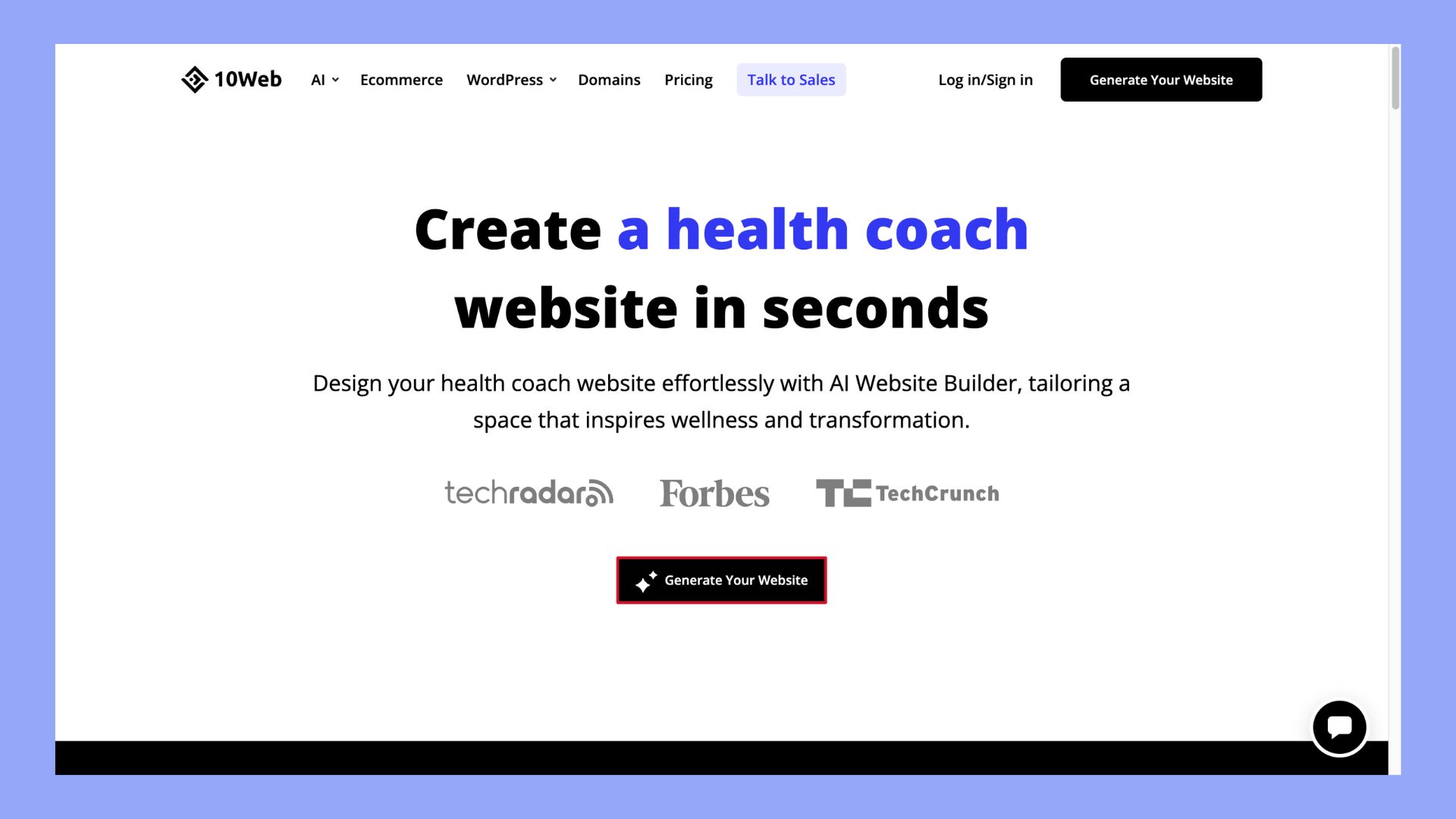
Developing your website
A professional website is crucial. Use the 10Web AI Website Builder to create a site quickly. Answer a short questionnaire, and the AI generates tailored content and images for you. No coding skills are needed.
Here’s how to create your website:
- Sign up on 10Web.io.
- Click on Generate Your Website.

- Proceed with the Create a new website with AI to get a professional website that is specifically designed for your health coaching business.

- Choose your business type and click Next.

- Write your business’s name and a short description of your business, which you can enhance by using an integrated AI feature, and then click Next.

- If you’re finding it difficult to come up with a name for your business that fits your business and services, try using 10Web’s Free Business Name Generator, where you’ll be able to get various business name ideas, while simultaneously checking whether a specific domain is available.

- Add the services that you currently offer and click Finalize.
Once all the questions are answered, you’ll need to wait a couple of seconds for the AI to generate a website that is mobile-friendly, fast, and secure.
Creating a social media platform
Choose platforms where potential clients are active. Focus on:
- Facebook: Great for community building.
- Instagram: Ideal for sharing visuals and success stories.
- LinkedIn: Useful for professional networking.
Share updates, tips, and client testimonials. Engage with followers by responding to comments and messages promptly.
Choosing your business name and branding
Your business name should reflect your values and services. Use the 10Web Business Name Generator for inspiration.
Steps to create effective branding:
- Choose a name that is easy to remember and spell.
- Design a logo that represents your brand.
- Select colors and fonts that align with your business identity.
Additionally, keep in mind that consistency in branding across all platforms helps build recognition and trust with your audience.
Step 2: Products and programs
To run a successful health coaching business, you need to offer various products and programs that meet your clients’ needs. These can include personalized coaching plans, online courses, and interactive workshops.
Designing your coaching programs and services
Your coaching programs should be tailored to meet the specific needs of your clients. Consider offering a mix of the following:
- Personalized coaching plans: Create custom programs focused on individual client goals.
- Group sessions: Host group coaching events to foster community support.
- Specialized packages: Offer topic-driven packages like stress management or nutrition plans.
Use feedback to improve your offerings. Regularly update your content to stay relevant. This helps maintain high-quality services that can attract more clients.
Creating and selling online courses and workshops
Online courses and workshops extend your reach and allow you to cater to a broad audience. To create effective courses:
- Identify your course topics: Choose subjects that resonate with your target market.
- Outline course content: Break topics into manageable sections.
- Use engaging formats: Include videos, quizzes, and interactive activities.
To sell these courses, use platforms like Teachable or Thinkific. Promote them through your website, social media channels, and email newsletters. By including various formats and engagement strategies, you can appeal to different learning styles and keep your audience engaged.

Looking to sell online?
Create your custom online store in minutes with 10Web AI Ecommerce Website Builder and take your business online.
Stage 3: Marketing and growing your network
Now, the focus shifts to promoting your health coaching business and expanding your professional network. Effective marketing strategies will help you reach potential clients and build a strong client base. Networking with other professionals in the industry will open up opportunities for collaboration and referrals, enhancing your business growth. By implementing these strategies, you can establish a robust presence in the health coaching market and foster meaningful relationships that contribute to your success.
Step 1: Marketing your health coaching services
Marketing is key to growing your health coaching business. You want to get your services in front of the right people, build a strong network, and create a marketing plan that works.
Creating a marketing plan and strategy
Your marketing plan should outline your goals, target audience, and the channels you will use. Start by defining who your ideal clients are. Consider their age, interests, and health needs.
Next, decide how to reach them. Use a mix of online and offline methods. Digital advertising, email marketing, and a well-designed website can attract more clients. Remember to highlight the unique benefits of your services.
Budgeting is also crucial. Allocate funds for different marketing activities and keep track of what works best.
Using social media to reach your target audience
Social media is a powerful tool for health coaches. Platforms like Instagram, Facebook, and LinkedIn allow you to connect with potential clients. Share content that educates, inspires, and engages your audience.
Post regularly about health tips, success stories, and upcoming events. Use hashtags to increase visibility and reach a larger audience.
Live sessions and Q&As can also be very effective. They offer a way to interact with your audience directly and build trust. Remember to respond to comments and messages to keep the conversation going.
Step 2: Sales and client relationships
Starting your health coaching business requires effective sales techniques and strong client relationships. These elements are critical for acquiring and retaining clients while building trust.
Acquiring your first client and growing your client base
Begin by identifying your ideal client. Define the specific type of person who will benefit from your health coaching services. Knowing your target audience helps tailor your marketing efforts and messaging.
Leverage social media platforms to reach potential clients. Join relevant Facebook groups, engage in discussions, and share valuable content. Networking events are also good opportunities.
Offer free workshops or webinars. These can showcase your expertise and attract interest from your target audience. Collect attendees’ contact information for follow-up.
Personalize your sales approach during conversations. Build a connection by understanding their specific needs and explaining how your services can help. Keep the interaction genuine to establish reliability and trust.
Building strong client relationships and trust
Establish clear communication with your clients. Make sure they know what to expect from your coaching services. Regular and transparent communication helps build trust. Provide consistent value in each session. Show your clients you are committed to their progress. Offer actionable advice and demonstrate a genuine interest in their well-being.
Additionally, solicit feedback regularly. Encourage clients to share their thoughts on your coaching methods. Use their feedback to improve your services. On the other hand, respect your clients’ privacy and maintain confidentiality. This is crucial for building a trusting relationship. Ensure them that their personal information and health details are secure.
Focus on long-term relationships by staying in touch even after the coaching period ends. Share tips, and updates, or invite them to future events. Strong relationships can lead to referrals and lasting success.
Step 3: Building your network for success
Establishing a solid network is crucial for your career as a health coach. It will increase your reach and help you gain more clients. Partnering with other professionals and generating referrals are key ways to build this network.
Networking strategies and partnering with other professionals
Connecting with other professionals in the health and wellness industry is important. Start by attending local and online events like wellness fairs, nutrition seminars, and fitness expos. Participate actively by asking questions and sharing your insights.
Join professional organizations like the National Society of Health Coaches or the American Council on Exercise. These groups offer networking events, resources, and support from other health coaches. Being part of a community will open doors to collaborations and partnerships.
Additionally, partner with complementary professionals. Work with personal trainers, dietitians, and therapists who can refer clients to you. Offer to share client leads with them as well. This partnership builds a mutual relationship that benefits everyone.
Generating referrals and testimonials
Ask your satisfied clients to refer you to their friends and family. Word-of-mouth referrals are one of the most effective ways to grow your business. Highlight the success stories of your clients and share how your guidance helped them achieve their goals.
You can also collect and display testimonials. Reach out to happy clients and ask them to write a brief review about their experience working with you. Post these testimonials on your website, social media pages, and marketing materials. Positive feedback builds your credibility and attracts new clients.
Offer incentives for referrals. Create a referral program where current clients receive a discount or free session for referring new clients. This encourages them to spread the word about your services. Keep track of referrals and follow up to convert potential leads into paying clients.
Step 4: Time management and personal growth
Balancing your personal and professional life is key to success as a health coach. Focusing on effective time management and continuous growth can help you achieve your business goals while staying true to your personal vision and passions.
Creating work-life balance as an entrepreneur
Managing your time well is essential for a healthy work-life balance. Prioritize your tasks by identifying what needs immediate attention and what can wait. Using tools like to-do lists or apps can help you stay organized. Also, set clear boundaries between work and personal life. For instance, designate a specific workspace and schedule regular working hours. This prevents burnout and helps you keep your stress levels in check.
Making time for self-care activities such as exercise, hobbies, and relaxation techniques are also important. These activities reduce stress and improve your overall well-being, making you more effective in your professional role.
Investing in personal growth and development
Continuously investing in your personal growth ensures you remain passionate and effective in your coaching business. Start by setting clear personal goals aligned with your vision. This could include learning new skills, attending workshops, or seeking mentorship.
On the other hand, regularly reflect on your experiences and learn from them. Keep a journal to track your progress and insights. This helps you understand your growth and areas that need improvement.
Engage with a community of like-minded professionals. Networking can provide support, share experiences, and offer opportunities for collaboration. Growth is a journey, and having a support system can make it more enjoyable and impactful.

Looking to sell online?
Create your custom online store in minutes with 10Web AI Ecommerce Website Builder and take your business online.
Expanding your business
Growing your health coaching business can be achieved by diversifying your services and scaling your operations. Focus on building multiple revenue streams and setting the foundation for long-term growth.
Exploring additional revenue streams: from one-on-one to corporate
Transitioning from one-on-one coaching to corporate wellness programs can significantly boost your income. Corporate wellness programs often have larger budgets and can provide steady work.
Steps to expand your services:
- Identify corporate needs: Reach out to local businesses to understand their wellness needs.
- Develop tailored programs: Create programs that target stress management, fitness, and nutrition for employees.
- Network and market: Attend business networking events and use LinkedIn to connect with potential corporate clients.
Additionally, consider offering online courses, group sessions, and workshops to reach a wider audience. These can be time-efficient and allow you to help more clients simultaneously.
Scaling your health coaching business for long-term growth
Scaling involves building a support system and automating your processes to handle more clients without compromising quality.
Steps to scale your business:
- Hire support staff: Employ admin assistants, marketing experts, or other health coaches to help share the load.
- Use technology: Integrate scheduling apps, customer relationship management (CRM) software, and online coaching platforms.
- Develop a strong brand: Ensure your logo, website, and social media profiles are consistent and professional.
Invest in your personal growth by attending workshops and getting advanced certifications. This will not only improve your skills but also add credibility to your business.
Conclusion
Starting a health coaching business is an exciting journey that lets you combine your passion for wellness with the chance to help others reach their health goals. By following the tips in this article—getting the right certifications, building a strong brand, and marketing your services well—you can create a solid foundation for a successful business. The growing demand for health coaches means a promising market, offering not just the potential for financial success but also the personal satisfaction of making a real difference in your clients’ lives. Embrace the challenges and rewards of this field, and watch your health coaching business thrive.



